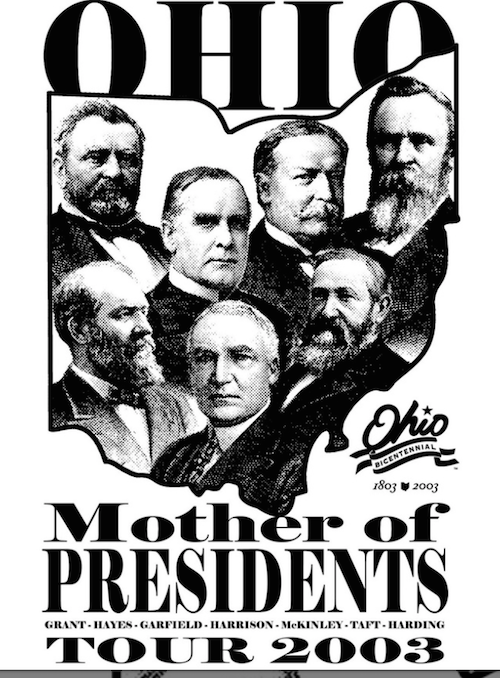Let's Hear It for Ohio and Its Presidents -- But that Alaska Mountain Should Be Called Denali

Related Link Jim Loewen's take on Denali
I am from Ohio and I have written extensively on Warren
Harding, the last president from Ohio and the first president to honor Alaska
(then a territory) with a presidential visit in the summer of 1923. So strenuous a trip was Harding’s amazing
journey by train--he trekked all the way to Fairbanks to drive the golden spike
on the Alaska Railway—that he overtaxed his already failing heart and died in
San Francisco at the Palace Hotel on August 2, 1923. He was sincerely mourned by a nation that had
grown to love him.
Harding deeply admired fellow Ohioan William McKinley. Like McKinley, Harding ran for president from
his front porch, bringing the world and celebrities to his simple hometown in
the middle of Ohio. By the time Harding
ran in 1920 (against another Ohioan, Democrat James M. Cox, Ohio’s governor,
who chose a young and still ambulatory Franklin D. Roosevelt as his VP
candidate), Ohio had become known as the “mother of presidents.”
Since the end of the Civil War half a century earlier, men
born in Ohio had ruled the presidency. Their number as presidents show the
domination: Grant (18th), Hayes (19th), Garfield (20th), Benjamin Harrison
(23rd), McKinley (25th), Taft (27th), and Harding (29th). William Henry Harrison, who is claimed by
Virginia, moved to Ohio and is sometimes included in the list of Ohio
presidents.
I argue that these presidents deserve much more credit than
they have been given. I do not share Karl
Rove’s politics, but I fully agree with him that McKinley was a
transformational president (Rove is coming out with a biography on
McKinley). By way of further disclosure,
my great-grandfather ran Democrat William Jennings Bryan’s campaign in Ohio
against Governor McKinley in 1896 (Bryan almost defeated him). So I was not naturally drawn to these Ohio
presidents, all of whom were Republicans.
But my study of Harding changed my (highly uninformed)
view. I have written recently that
Harding’s presidency had significant achievements, all of which have been
unfairly overrun by the specter of scandal (mostly related to his marital
infidelities). Harding cut taxes after
the war, balanced the budget, created the first Bureau of the Budget (today the
OMB), oversaw the first world arms’ limitation treaty, pardoned Socialist and
labor leader Eugene Debs and hundreds of
other political prisoners, and he gave a brave Civil Rights speech in
Birmingham, Alabama in 1921, at the height of racial intolerance. While he was
not calling for social equality (neither did Lincoln), he did insist on
political equality—a radical position for any national politician of the time.
What I have since seen is that Ohio presidents occupied a
unique and powerful position in the formation and building of this
country. If Virginia boasts the “Founding
Fathers” (a term attributed to Warren Harding), Ohio can say its presidents
were the “Saving Fathers.”
Most were Civil War generals, who fought for the Union. Even
McKinley was a young sergeant in the Army who served heroically in battles like
Antietam. And who but Ulysses Grant
could have held the fractured nation in tact after such a bitter civil
war. As Jay Winik points out in his book
April 1865, most civil wars in
history have devolved into horrific guerilla wars. Ours did not. Grant in the White House assured that wouldn’t
happen in the United States.
These Ohio presidents not only saved the nation, they
stitched it back together. Hayes ended
the federal occupation of the South, starting the admittedly difficult process
of re-assimilation (which would include the rise of Jim Crow policies), but he
probably saved the country.
McKinley then took the nation to world power. And he brought us Theodore Roosevelt, who
succeeded him when he was assassinated in 1901.
Taft continued TR’s trust busting policies and was one of
the most important advocates for the independence of the judiciary. He was the only person ever to serve as
president and Chief Justice of the United States.
Harding calmed a troubled nation and world. He provided stability when the world was in
tatters.
These are not inconsequential presidents. And they deserve respect. I have been advocating for some time the
creation of an Ohio Presidential Center, to study the presidency and to
re-evaluate the Ohio presidents in particular.
Presidential libraries started with FDR and the law only provides for
libraries supported by the National Archives back to President Hoover, FDR’s
predecessor.
All this said, I believe it is the right move to return the
name of the great mountain in Alaska to Alaskans. Denali is a beautiful name and
sentiment. I suspect that President
McKinley would humbly agree, as I am sure Harding would. Harding went to Alaska to pay homage to the
people living there and to rejoice in their heritage. He also spoke out in favor of the protection
of Alaska and its irreplaceable natural beauty and resources.
My only problem with the way this was handled was that it
seemed as if Ohioans and their presidents were once again being disrespected. How much better it would have been for a
ceremony at the Ohio Presidential Center in which Ohioans and Alaskans could
meet to celebrate their mutual affection, with Ohioans generously returning the
naming rights to the people who have lived in Alaska since time out of mind.
Warren Harding would have smiled.